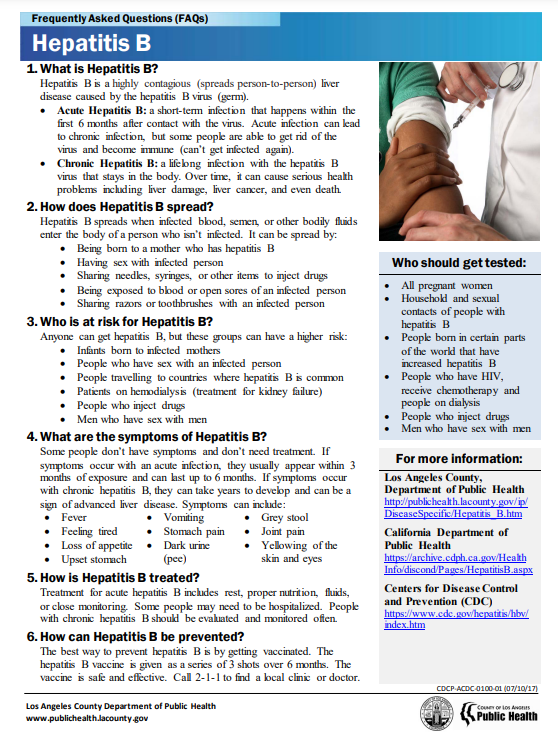CDC recommends routine Hepatitis B vaccination for infants, children, adolescents, and adults.
Infants and Children
CDC recommends a dose of single antigen hepatitis B vaccine (Engerix [GlaxoSmithKline] or Recombivax [Merck]) within 24 hours of birth for all infants born to persons who are HBsAg negative. Additional doses should be administered at ages:
The 3rd and final dose should be administered at age 6 months (24 weeks).
A 4th dose and final dose is required at age 6 months when using combination vaccines such as Pediarix (GlaxoSmithKline) or Vaxelis (Sanofi Pastuer).
Vaccine recommendations for infants born to persons who are HBsAg positive or unknown can be found here.
All children and adolescents aged <18 years not previously vaccinated require 3 doses at 0, 1, and 6 months.
Adolescents ages 11 – 15 years may receive a 2-dose series of Recombivax at 0, 4 – 6 months. The 2-dose series should be completed prior to the 16th birthday.
Adults
CDC recommends the following adults receive hepatitis B vaccination:
- Adults 19 – 59 years
- Adults 60 years and older with certain risk factors for hepatitis B
- Adults not previously vaccinated should receive 2 or 3 doses of hepatitis B vaccine depending on the brand used.
| Vaccine Brand |
Number of Doses |
Schedule |
Age |
Dose & Route |
Engerix
GlaxoSmithKline |
3 |
0,1, and 6 months |
Birth - 19 years |
0.5 mL IM |
| 3 |
0,1, and 6 months |
≥ 20 years |
0.5 mL IM |
| 4 |
Adults on hemodialysis |
0,1,2, and 6 months |
2 mL IM or two (2) 1 mL doses |
Recombivax
Merck |
3 |
0, 1, and 6 months |
Birth - 19 years |
0.5 mL IM |
| 2 |
0, 4-6 months |
11-15 years |
1 mL IM |
| 3 |
0,1, and 6 months |
≥ 20 years |
1 mL IM |
| 3 |
0,1, and 6 months |
Adults on pre-dialysis or dialysis |
1 mL IM |
Heplisav-B
Merck |
2 |
0 and 1 month |
≥ 18 years |
0.5 mL IM |
PreHevbrio
VBI Vaccines |
3 |
0,1, and 6 months |
≥ 18 years |
1 mL IM |
Pediarix
(DTap-HepB-IPV)
GlaxoSmithKline |
3 |
2, 4, and 6 months |
6 weeks - 6 years |
0.5 mL IM |
Vaxelis
(DTap-IPV-Hib-HepB)
MSP Vaccine Company |
3 |
2, 4, and 6 months |
6 weeks - 4 years |
0.5 mL IM |
Twinrix
(GlaxoSmithKline) |
3 |
0, 1, and 6 months |
≥18 (primary) |
1 mL IM |
| 4 |
0, 7, 21-30 days;
Booster at 12 months |
≥18 (accelerated
schedule) |
1 mL IM |
All hepatitis B vaccines are highly effective in preventing HBV infection. Overall, hepatitis B vaccination produces seroprotection in 98% of healthy term infants.






